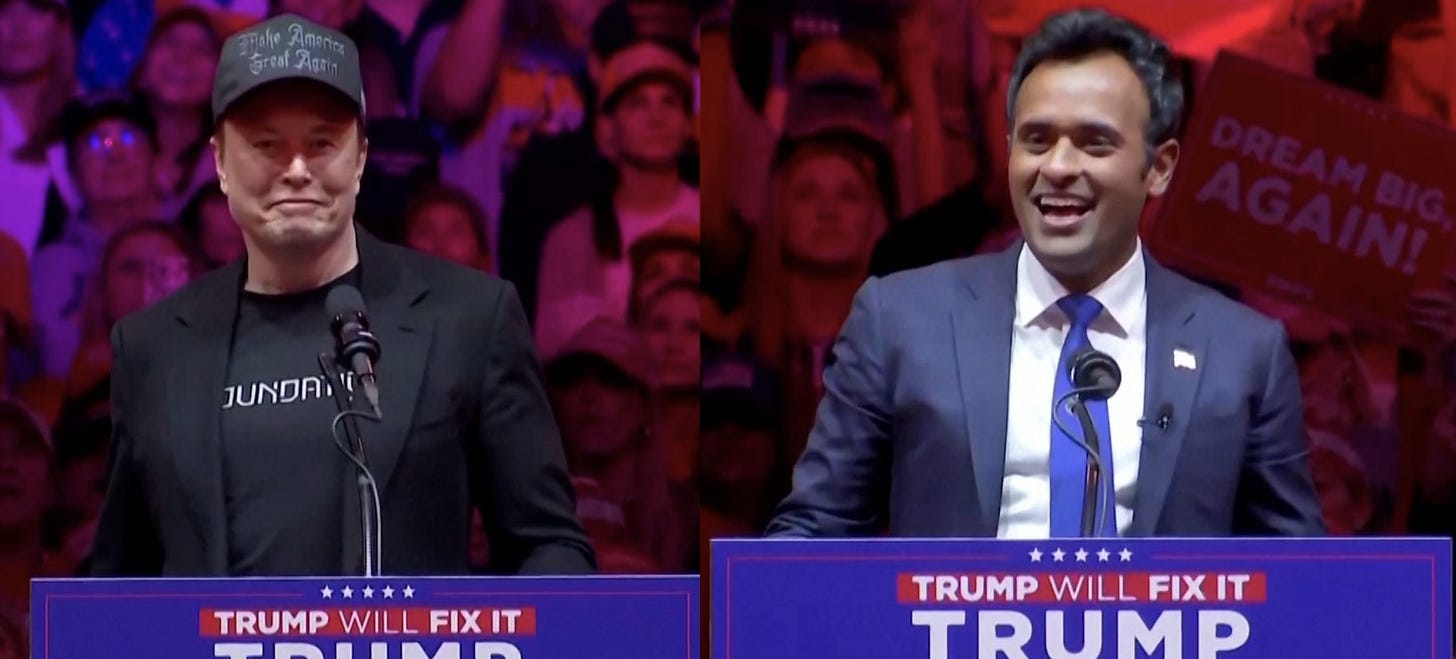"Unlike government commissions or advisory committees, we won’t just write reports or cut ribbons. We’ll cut costs."
My dudes… you ARE an advisory committee.
Elon Musk and Vivek Ramaswamy’s Department of Government Efficiency (DOGE) may tout an ambitious mission to streamline the federal government, but it will have no direct authority to cut regulations or budgets. As an advisory body, DOGE’s role is limited to offering recommendations, not making binding decisions.
Musk and Ramaswamy cannot operate in the shadows. Their activities must comply with the Federal Advisory Committee Act (FACA), which requires the same level of transparency and accountability expected of any government advisory committee.
The Federal Advisory Committee Act (FACA) is a foundational statute enacted in 1972 to promote transparency and accountability in the operations of federal advisory committees (5 U.S.C. app. 2). aimed at ensuring that advisory groups providing recommendations to the federal government operate with transparency and accountability.
With the establishment of the Department of Government Efficiency (DOGE), spearheaded by Elon Musk and Vivek Ramaswamy, it is clear that this entity will fall under FACA’s purview. Despite claims that DOGE is not like other government commissions or advisory committees, its structure and purpose fit squarely within FACA’s definition of an advisory committee.
The Claims
“We are entrepreneurs, not politicians. We will serve as outside volunteers, not federal officials or employees.”
Reality: The status of its leaders as volunteers or entrepreneurs does not exempt DOGE from FACA. Any entity utilized by the federal government to provide advice is subject to FACA’s requirements, including open meetings and transparency. Musk and Ramaswamy’s involvement, as non-federal members providing collective advice, further solidifies DOGE’s classification as a FACA-regulated body.
“We will focus particularly on driving change through executive action based on existing legislation rather than by passing new laws.”
Reality: Advisory committees do not “drive change”—they advise. FACA ensures that DOGE’s recommendations are transparent and publicly vetted. Any executive actions resulting from its advice must be grounded in clear processes and subject to public oversight, preventing unilateral or hidden decision-making.
“We expect to prevail [against] the onslaught from entrenched interests in Washington.”
Reality: FACA’s transparency requirements ensure that all stakeholders, including those “entrenched interests,” have access to DOGE’s deliberations and records. DOGE cannot operate in secrecy or circumvent public scrutiny, regardless of its adversarial stance.
“We’ll help end federal overspending by taking aim at the $500 billion plus in annual federal expenditures that are unauthorized by Congress or being used in ways that Congress never intended.”
Reality: DOGE has no direct authority to “take aim” at federal expenditures. Its role is to advise the administration, with all recommendations subject to rigorous review and public disclosure. FACA ensures that such activities remain transparent and accountable.
Why DOGE is Covered by FACA
FACA defines an advisory committee as any group established or utilized by the President or a federal agency to provide advice or recommendations. DOGE meets this definition for several reasons:
Advisory Role: DOGE’s stated mission is to provide recommendations to the president and federal agencies on regulatory rescissions, administrative reductions, and cost savings. This advisory function is central to FACA’s scope.
Utilization by the Federal Government: Although DOGE leaders claim to be independent entrepreneurs, the article makes it clear that DOGE will work closely with the White House Office of Management and Budget (OMB) and embed legal experts within federal agencies. Such utilization by the government solidifies DOGE’s classification as an advisory committee.
Involvement of Non-Federal Members: FACA applies to committees that include non-federal employees providing advice to the government. With leaders like Musk and Ramaswamy serving as external advisors, DOGE fits this criterion.
Establishment by the Executive Branch: DOGE is explicitly created as part of the Trump administration’s initiative, making it a formal advisory body under FACA.
What FACA Compliance Means for DOGE
Once classified as an advisory committee under FACA, DOGE will need to meet specific transparency and accountability requirements. These include:
Open Meetings
FACA mandates that advisory committee meetings be open to the public unless specific exemptions apply. This means DOGE’s deliberations on regulatory cuts, employee reductions, and cost-saving measures cannot occur behind closed doors. Instead, DOGE must:
Provide advance public notice of all meetings, including time, location, and agenda.
Allow public attendance and participation where appropriate.
Document and make meeting minutes publicly accessible.
Open meetings ensure that the public, stakeholders, and affected parties have an opportunity to observe and scrutinize DOGE’s decision-making processes. For an entity with such sweeping objectives, this transparency will be essential to maintaining public trust.
Transparency in Operations
FACA requires advisory committees to operate transparently, ensuring that their activities are subject to oversight. For DOGE, this means:
Publishing detailed reports of their recommendations and findings.
Disclosing the names, roles, and affiliations of committee members.
Making relevant documents and data used in decision-making available to the public.
DOGE’s ambitious agenda to rescind regulations and cut federal employment raises significant public interest. Transparency will be key to ensuring that its actions are seen as legitimate and free from undue influence.
FOIA Compliance
FACA brings advisory committees under the purview of the Freedom of Information Act (FOIA). This means DOGE will be required to:
Maintain records of all communications, deliberations, and materials related to its advisory role.
Respond to FOIA requests from journalists, advocacy groups, and the public seeking access to these records.
FOIA compliance is especially important given the far-reaching implications of DOGE’s work. Regulatory rescissions and cost-cutting measures can impact industries, communities, and individuals nationwide. FOIA ensures that stakeholders have the ability to obtain information about how decisions were made and the rationale behind them.
Open meetings, transparency in operations, and adherence to the Freedom of Information Act (FOIA) are non-negotiable. DOGE’s compliance with these requirements ensures that its work is subject to public scrutiny and cannot be hidden behind closed doors. While this might frustrate their vision of rapid and decisive action, it reflects the fundamental principle that government—even when advised by high-profile figures—must remain accountable, transparent, and democratic.





